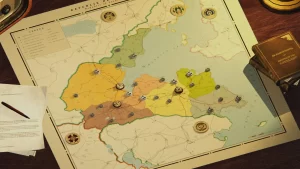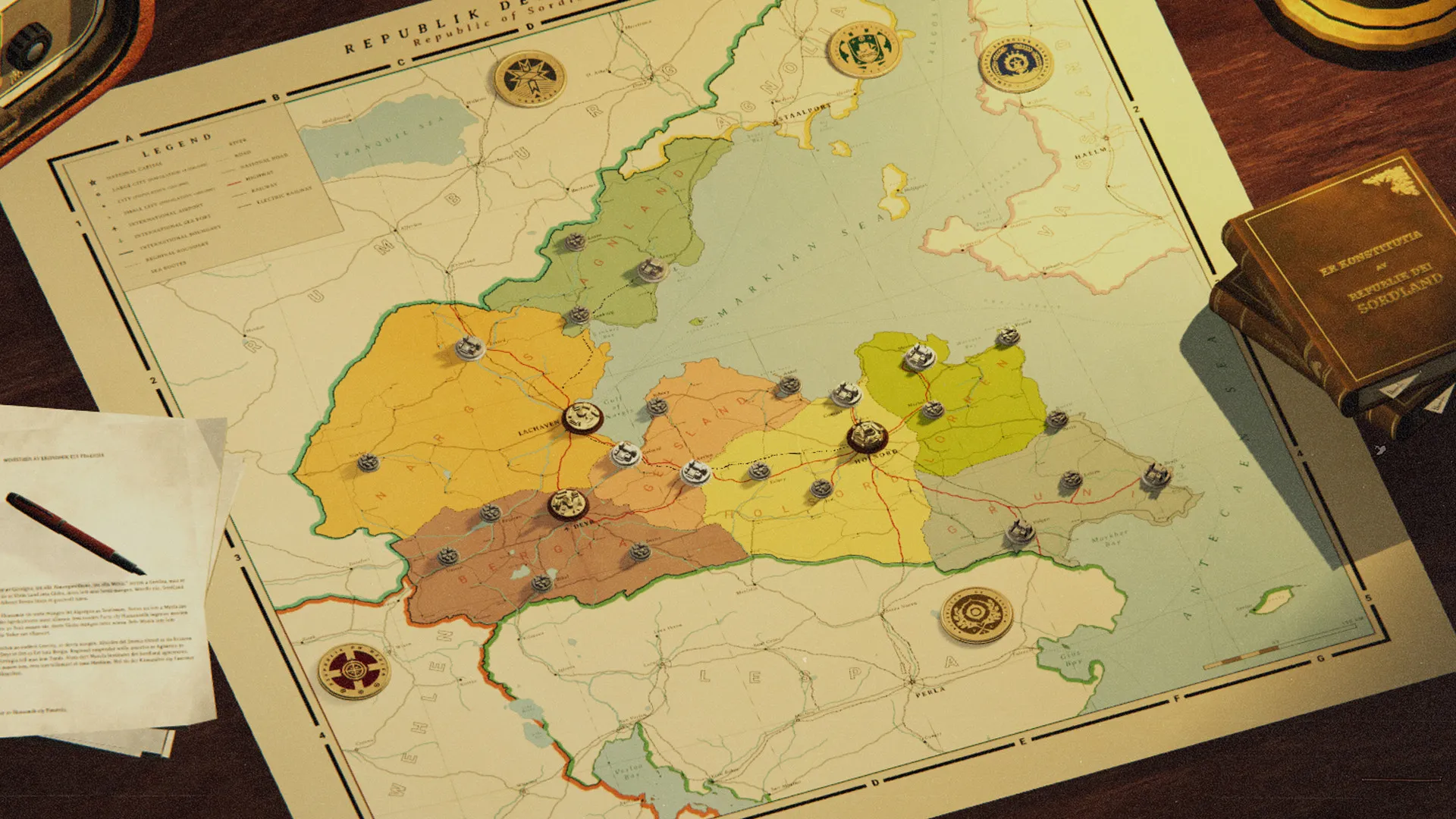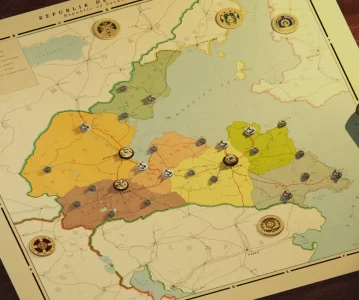Sam Dee argues that when it comes to video games and political education, interactive fiction-based titles like Torpor Games’ ‘Suzerain‘ have far more to teach than classic grand strategy.

It should be stated that a map had been ordered for me from Moscow. It had hung on the wall without the slightest use having been made of it, and its size, and the good quality of the paper, had long tempted me. I decided upon making a kite of it.
—The Captain’s Daughter, Pushkin
Chess, go, shogi—many of the oldest games that we still play concern themselves with teaching military strategy. As fun as they might be, the kind of mechanical abstraction that defines them makes them almost useless for learning politics. Worse, many contemporary strategy games are glorified exercises in capitalist exploitation (see: all Eurogames like Settlers of Catan). But games are everywhere, especially among leftist nerds.1 How can we learn socialist political strategy through play?
I believe political strategy is best simulated with interactive fiction, rather than the kind of grand strategy that most associate with the strategy genre. Interactive fiction—an early model for adventure RPGs like Dungeons & Dragons but also the genre of dating sims—is often overlooked in comparison to more immersive “serious” genres like first-person shooters and multiplayer online battle arenas. With the case study of Suzerain, a simulation of mid-20th-century national politics, I want to show how interactive fiction can help us think our way through political dilemmas, by building skill.
Game of Sovereignty
The main campaign of Suzerain puts you in the shoes of Anton Rayne, the nation of Sordland’s newly elected president. Sordland was long a dictatorship under pragmatic nationalist Tarquin Soll; its first president Ewald Alphonso, a liberal reformer interested in opening Sordland’s markets, met with lukewarm failure. Through a long string of narrative choices, from Rayne’s background and education to navigating election platforms, legislative reform, and international negotiation, you choose what kind of Rayne tries to meet his fragile nation’s needs. Each decision fork charts Sordland’s course towards stability or collapse, and what exactly that looks like.
Early choices of party platform and economic development come to haunt you when, for example, your choice of contractor fails—in one of my playthroughs, the outsourcing capitalists simply can’t handle the scope of a cross-national railway. And whether you can eke your flagship projects over the line determines your chances of getting a second presidential term. All of those choices also take place within a balance of personal and international politics. Sordland is a middling regional player in a world riven by proxy fights between the Arcasian Treaty Organization (i.e., NATO capitalists) and the Contanan Security Pact (i.e., Warsaw Pact communists), with a range of other economic and political alliances (e.g,, the monarchists). What you promise and deliver to different local political players, like the nationalist United Sordland Party (USP) that elected you, determines your support and opposition.
The way many differing political scales (personal, societal, international) affect each other is Suzerain’s best contribution to simulating conflict. Choices to increase economic independence and shore up Sordland’s nationalist traditions will estrange you from both global power blocs. And then, if you blunder to the point that a war is declared upon Sordland, will you recall your son from his tour of military duty? Will he forgive you if he does? You can push a program of communist economic development but then still need to negotiate support from local capitalists that hold entire sectors of the economy under their sway, like Sordland’s newspapers and steel industry.
Over 12 turns, split over potentially two presidential terms, the vision of a stable Sordland that you have Rayne set out (or not, it is possible to play for incompetency and, e.g., sink into alcoholism) is tested through domestic and international conflict. The Bludish people try to flee to Sordland to escape a genocide at the hands of a Wehlen autocrat modeling himself after Rayne’s authoritarian predecessor, Tarquin Soll. The nearby capitalist country of Lespia tries to entangle Sordland in free-trade deals that would open up its protectionist economy to international influence. The Maleyenvist Contanan Security Pact wants to ensure Sordland’s non-interference in its dispute over an island territory. And the Rumburg empire eyes Sordland as a solution to its vast energy demands. Internally, Rayne struggles to balance demands for better working conditions, women’s suffrage, funding for a decrepit military, and the rise of opposition to Sordland’s only party, the USP. The results range from victorious reelection to shameful retirement, assassination, or nuclear war.
In an expansion, you can play as the new ruler of a monarchy, Rizia, in the same region as Sordland. That campaign explores the challenges of maintaining an absolutist monarchy in an age of parliamentary republics. But what can spending hours shaping the psyches and politics of these pasty dudes teach us?
What Games Do in Politics
While videogames like Suzerain contain art, writing, and written narrative, it is the experience of play itself that sets games apart from other media. For a time, rules and mechanics (and how they can be bent) shape players’ experience of who and how they exist within the game. Through the limited agency they give players, games ask for a kind of projected identification as a baseline for participation. In the 2010s, for example, this possibility and new means of digital distribution created a surge in expressive queer games, inspired by works like Anna Anthropy’s dys4ia, Avery Alder’s The Quiet Year, and Emily Short’s experimental Galatea.
Games can make their political arguments through their theme alone—Magic: The Gathering designer Richard Garfield calls these a game’s “conceit.” For example, an adaptation of checkers made to raise funds for the Women’s Social and Political Union, Suffragetto, uses an asymmetrical description of police–activist conflict to express hypocrisies of state oppression in early 20th-century Britain. Historian Renee Shelby points out that police removed from the board are placed in “hospital” spaces, while suffragettes are put in “prison”, and police “arrest” suffragettes while suffragettes “disable” police, with jiu- jitsu.2 But the mechanics of Suffragetto imply an equivalence between the two sides—both have parallel victory conditions and a two-tier hierarchy of small and large pieces. Through play, Suffragetto requires players to consider police and suffragettes as equal combatants engaged in the military control of public space.
This kind of political argument in games is made through the mechanics of the game itself—its rules, victory conditions, the systems they contain and the actions they ask players to take within them. Games scholar Ian Bogost developed a theory of “procedural rhetoric” to describe this kind argument:
…procedural rhetoric entails persuasion—to change opinion or action […] its arguments are made not through the construction of words or images, but through the authorship of rules of behavior, the construction of dynamic models.3
Suffragetto contains one example of procedural rhetoric. The 1960–70s US New Games movement that grew out of the anti-war movement is another: New Games proponents couldn’t end war around the world but, through play, they could create moments when victory through violence wasn’t socially possible. Entire generations of US children have grown up going to physical education with noncompetitive, playful games as a result.
Another example: Lucas Pope’s border-control simulation Papers, Please uses a Soviet aesthetic to explore working under extreme scrutiny. Contrary to its appearance, the result is an indictment of wage labor. You are only paid for each correct migrant admission within a time-limited day, and your government’s increasingly complicated document authentication eats into your wages by reducing the rate of admission. And moral indecision comes at a cost: allowing regional refugees into your fictional homeland Arstotzka docks wages. When I first played Papers, Please, I found it intensely, subjectively compelling—you feel yourself bound to that desk and those papers. Now that I’ve worked for long enough, I can’t comfortably play through a whole campaign. It’s too stressful. The decision to toggle between paying for heating one day and food the next feels a little too real.
Procedural rhetoric, as an engaging tool, is a natural aid for educational programs. Because players have to pretend, act as if, the rules of a game are sacrosanct, they experience what it would be like to live under its strictures and be able to exercise its freedoms. Monopoly, a classic US example, teaches players to join in auctions, rent extraction, and the consolidation of capital into monopolies. Ironically, it did not begin that way. Elizabeth Magie created The Landlord’s Game in 1904 as a way to teach and advocate for Georgist land reform. Magie intended that players would play two versions of the game: first with single-victor rules similar to those we know from Monopoly, and a second with a collective victory condition based on equitable wealth distribution. The rhetoric in this case comes from the explicit comparison of the two systems: one ends with most players frustrated and upset after a long slow defeat, the other ends in collective victory and land distribution.
More recently, academics developed the boardgame Loy Loy to teach literacy in the methods of “rotating savings and credit associations” (ROSCAs) used in Cambodia to pool resources. The game creates collaborative win conditions (e.g., collective ownership of a garment factory), within a capitalist economy that allows for individuals to betray the collective:
Rather than uncritically accepting a poverty line, Loy Loy encourages players to consider the intense pressure to work and earn money in contemporary capitalism and how this can be eased by mobilizing older, historic ROSCAs. Players will understand how the poverty cycle is a rocky road without the support of a community. When placed in poverty, life is both risky and expensive, meaning large unexpected shocks can spell financial ruin without group savings, sharing, and risk management. […] Through Loy Loy, players come to understand the dynamics of these relationships by inhabiting the roles of ROSCA members in a simulated context where ‘going it alone’ puts them at a significant disadvantage.4
While the education in ROSCA mechanisms is useful for any player, its multiple victory conditions and light roleplaying elements mean that “Loy Loy does not expect a universal cohesive consciousness within all players.” The resulting game, as anthropologist Farah Qureshi emphasizes, requires players to identify with a Cambodian garment worker with no access to banking or other large credit systems—an act that will be more or less difficult based on players’ material wealth outside the game.
Simulating Strategy
Worker cooperative organizing, rhetorical arguments for equality and peace embedded into leisure activities—hopefully the potential for games to play a part in leftist political education is clear. But when it comes to education in political formations and strategy, available materials are scarce. Unfortunately for us, the most popular, widely distributed strategy games are usually procedural arguments for capitalist exploitation or military domination.
Many strategy videogames draw from the boardgame traditions of wargaming—traced back to 19th-century Kriegsspiel, used to train Prussian military officers—or colonial Eurogames, like Settlers of Catan or Puerto Rico. In a previous article, I argued that grand strategy games like Civilization III and Europa Universalis IV reproduce colonial narratives of history, but their engines only allow for an impoverished counterfactual history—one that remains within the confines of a particular engine. These games ask players to maximize economic exploitation or assume a kind of godlike perspective of conflict that at best abstracts any broader social structures into a handful of numbers.
In these models, grand strategy games like those produced by Paradox Interactive privilege specific models of historical change—usually repressive ones. In the Europa Universalis series, the world is seen and acted upon from the perspective of burgeoning colonial nation-states. In Crusader Kings games, there is the European Christian feudal lord. All other state formations are crudely simulated through tweaks and adjustments that still leave, e.g., an Indigenous group playing much like a constitutional monarchy. All players’ affective engagement with the game is isomorphic. You still fight over little colored squares on a map; you just have inferior technology and an incentive to “Westernize.” That is, there is a differentiation at the level of the games’ “conceit” but a conflation in mechanics that prevents them from schooling players in another way of practicing politics, as a game like Loy Loy does. This is poor practice for imagining a world where society works differently.
A lot of leftist games make use of procedural rhetoric to provide agitprop or political education. I think Suzerain, with its fictional, alternate history, is doing something different. It does teach about a political subject (it has a lot to say about the Cold War) and it does give you a glimpse into a particular subjectivity (the world as a map with game pieces, your life as strings of text). But it is also teaching political skill. All of the ideologies present within the game world are represented in the individuals that speak to you. How you treat them, personally, shifts your own ideological alignment.
Interactive fiction—so text heavy—has often been criticized by, e.g., strategy gamers for not being as “serious” as a wargame with scads of numerical tables and dice. In the case of Suzerain, however, the squishy ambiguity of text requires more social skill for players to successfully analyze and respond to. In both Suzerain campaigns, you only have two measures of resources to count on (for Rayne, it’s national vs. personal wealth). Everything else is a qualifying status to, e.g., social welfare or the economy that gives at most a sentence or two of description. Hiding from the player the exact consequences of their actions makes perfect decision-making impossible—does it matter that your leading general has stopped saluting you? Do you care?
There are limits to what this system can simulate, given the constraints of interactive fiction. The branching narrative structure of these games means that the more options a player is given, the more work developers have to do. As a result, some choices are sculpted to, secretly, have no meaningful effect on the game. And the need to offer a balance of ideological options for Rayne to adopt means that there isn’t a qualitative difference in the game between playing a nationalist communist vs. a free-market neoliberal. In a way, just the names and how they feel about you change—you’re still clicking dialogue options. And finally, near the end, the need to shunt the player into a handful of set endings means that the sense of agency is quickly curtailed. Still, the result asks players to do the kinds of political calculations and maneuvering that is almost completely absent from the genre of strategy games.
In my opening epigraph, the comic lead of Pushkin’s Captain’s Daughter Pyotr Grinyov makes a mockery of his own education. His father, a serious striver, wants to secure his son’s future and surrounds him with all the pedagogical accoutrement he can find—books, maps, a French tutor. Lazy Pytor spurns the tools of statecraft, but familial connections and paper tricks still bring him a post as an officer in one of a line of Russian fortresses (Pytor is enlisted but “on leave” from birth until his posting). The map, an abstraction turned into a toy, is useless for making his path.
In building another world, are we any better? I grew up playing too many videogames and felt fiercely defensive of them as a media. I have become more skeptical of them as time has gone on. Through the microtransaction and loot-box profit models developed for mobile gaming, capitalist developers have created new forms of gambling and addiction. Many digital games teach players to be exploited in their spare time. Eurogames teach capitalist principles of exploitation, and grand strategy allows us to pretend that a social revolution could ever look like a military exercise. But in games like Suzerain, I see the possibility that play can be recuperated.

- Although the games industry is in tumult, as the massive AAA studios fall apart. See: Nathan Grayson, “It’s Been A Bad Year For The Video Game Industry, But A Good One For Unions,” Aftermath, November 7, 2023, https://aftermath.site/its-been-a-bad-year-for-the-video-game-industry-but-a-good-one-for-unions.
- Renee Shelby, “‘I Incite This Meeting to Rebellion’: Radical Feminism and Police Violence in the Early 1900s Board Game Suffragetto,” ROMChip: A Journal of Game Histories 1, no. 1 (July 2019), https://romchip.org/index.php/romchip-journal/article/view/46.
- Ian Bogost, Persuasive Games: The Expressive Power of Videogames (MIT Press, 2010).
- Farah Qureshi, “Simulating the Community Bank: Postcolonial Capital, ROSCAs, and Game Design,” Analog Game Studies 5, no. 1 (May 2018), https://doi.org/10.1086/449960.




